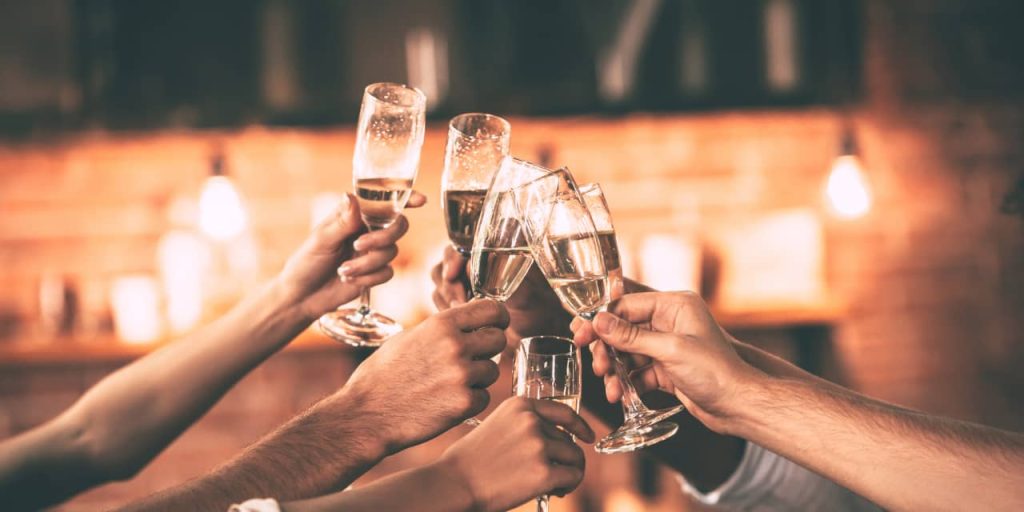It’s getting to be time to break open the bubbly.
Yes, New Year’s Eve is upon us. And that means people will be looking to toast the new year with a sip of Champagne or another sparkling wine.
Americans certainly have a taste for the fizzy stuff. The U.S. is the top export market for Champagne, and sales increased by nearly 20% in 2022 to roughly $1 billion, according to an industry tally.
That news comes at a time when there’s growing concern that Champagne could be in short supply in the years ahead because of climate change. Specifically, there’s fear that the grape varieties that go into the beloved bubbly are “on the brink of extinction,” according to a CNN report that cited data from Climate Ai, a Silicon Valley startup.
But for now, let’s focus on the immediate question: Which sparkling wine should you sip come New Year’s Eve — Champagne or something else? Here are some suggestions worthy of a Weekend Sip.
Bollinger Champagne has always been 007’s bubbly of choice — and the brand has even released James Bond-themed bottles.
AFP via Getty Images
The James Bond bubbly: The British secret agent of literary and cinematic fame may be known for how he likes his martinis prepared — shaken, not stirred, of course. But Agent 007 also enjoys a good sip of Champagne. His preferred brand of the French favorite has been Bollinger, which offers a variety of expressions at different price points. A recent one that stands out is its PN AYC 18 release, which sells for around $140. The PN stands for pinot noir, the key grape varietal that goes into the bottle, while the AYC refers to the Aÿ cru, or the prized area where the grape is sourced. The bottle is described as a “serious, understated and rich” sip — and one that’s a slightly different take on the traditional French Champagne.
Billecart-Salmon’s Nicolas François 2008 release, at left, is available on its own for $249 or in a special holiday gift set with another bottle of bubbly for $349.
Billecart-Salmon
The price-is-no-object bubbly: We’re not talking Dom Perignon, but rather another Champagne house with a very special bottle — namely Billecart-Salmon, a producer with a history going back back to 1818. Its Nicolas François 2008 release honors its co-founder, one Nicolas François Billecart. At $249 a pop, it’s at the higher end of the price spectrum, but it’s billed as a worthy blend of chardonnay and pinot noir grapes with a generous and full character.
The rosé bubbly: You love rosé wine and you love Champagne. So, what’s the ideal New Year’s Eve pick? A rosé Champagne, of course. The Palmer & Co. Champagne house offers its Rosé Solera for $91.99 — solera refers to a blending technique — which has already garnered acclaim. It was named one of the 20 best rosé bubblies in 2023 by the VinePair site, which praised it for its “dense fruit” flavors and “fine bubbles.”
The Spanish bubbly: What I love about cava — Spain’s popular sparkling wine — is that it delivers all of those delicious bubbles for a fraction of what you’ll pay for the French (or even American) equivalent. Segura Viudas is one of the best cava producers, and its “pricey” bottle — the Reserva Heredad, at $30 — is a still a bargain of a sipper with good acidity and notes of dried fruit.
Chandon is a California brand with a French connection — and it’s honoring its half-century of history with a special 50th-anniversary release.
Chandon
The California bubbly: California is a bit newer to the bubbly game than France, but it has its own history. And in the case of Chandon, it’s a history with a French connection. The brand was established in 1973 as a French-owned one, part of the Moët et Chandon family, and the Chandon team says its goal is to “combine traditional French techniques and winemaking knowledge with the beautiful, sun-ripened fruit of California to craft sparkling wines of the highest quality.” To taste some of this history, you can pop open a bottle of Chandon’s special 50th Anniversary Cuvee release, at $75. It’s a sparkler that indeed reflects a half-century of know-how, since all four winemakers in Chandon’s history collaborated on it. Expect flavors of brioche, ginger and honeycomb candy, according to the brand.
Lyre’s Classico Grande offers a way to toast the new year — sans alcohol.
Lyre’s
The non-alcoholic bubbly: If you’re following up your New Year’s Eve celebration with the month-long alcohol-free ritual known as Dry January, perhaps you’ll want to get a head start with a bubbly sans the boozy kick. There are several such offerings now on the market, but I’ve especially liked Lyre’s Classico Grande, which bills itself as a “premium non-alcoholic celebration in a bottle” and sells for $19.95. This isn’t soda but a wine-like sip made using a proprietary technique that involves arresting the fermentation of the grapes. You can be as skeptical as you want, but I say it’s delish no matter what.
Read the full article here
